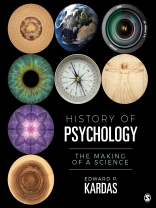History of Psychology: The Making of a Science
provides students with a comprehensive overview of the formulation of the field of psychological science. Starting with a chapter on 21
st Century Psychology and then jumping to the dawn of civilization, author
Edward P. Kardas is able to make connections between early understandings of human behavior with our current understandings and interpretations of psychological research. Through highlighting the zeitgeist of the era and making connections to the related fields of philosophy, computational science, biology, and social science, students will have a deeper understanding of how and why the field has formed in its current landscape and a sense for where it’s headed next.
विषयसूची
Chapter 1 21ST CENTURY PSYCHOLOGY
Chapter 2 PSYCHOLOGY IN PREHISTORY
Chapter 3 GREEK PHILOSOPHY
Chapter 4 FROM FAITH TO HUMANISM
Chapter 5 FROM THE RENAISSANCE TO THE DAWN OF SCIENCE
Chapter 6 FROM PHILOSOPHY TO SOCIAL SCIENCE
Chapter 7 INTROSPECTIVE PSYCHOLOGY
Chapter 8 BIOLOGICAL PSYCHOLOGY
Chapter 9 FUNCTIONAL PSYCHOLOGY
Chapter 10 BEHAVIORISM
Chapter 11 NEOBEHAVIORISM
Chapter 12 GESTALT PSYCHOLOGY
Chapter 13 PERSONALITY & PSYCHOPATHOLOGY
Chapter 14 COGNITIVE PSYCHOLOGY: REVOLUTION OR EVOLUTION
लेखक के बारे में
Edward P. Kardas is distinguished professor of psychology and director of the Honors College at Southern Arkansas University (SAU) where he has worked since 1980. He received his Ph D in Comparative-Developmental psychology from Louisiana State University. Before arriving at SAU he taught at Louisiana State University at Eunice and the University of Wisconsin-Milwaukee. He is the author or co-author (with Tommy Milford, formerly of SAU) of two books on using the Internet and the World Wide Web in teaching and two textbooks one on psychological research methods (with Chris Spatz of Hendrix College) and the other on the history of psychology. Along with Tracey Henley and Matt Rossano, he edited the Handbook of cognitive archeology: Psychology in prehistory. That volume’s 27chapters covered prehistoric human behavior under four headings: developmental psychology, cognitive psychology, social psychology, and personality and clinical psychology. Kardas has taught nearly all of the courses on the scientific side of psychology including research methods, learning, physiological and comparative psychology, and the history of psychology. He was an early adopter of computer technology moving from Apple II+ computers to Macs to i Pads to i Phones and to online education. His current scholarly activity revolves around research about honors education. Prior to COVID he led student travel experiences to Paris, Italy, and Cuba. In Cuba, Juping Wang of the SAU Modern Languages department and he developed a formal educational exchange program with the University of Artemisa. SAU and Artemisa students and faculty participated in several programs in both countries and eventually painted two matching murals, one on each campus, to commemorate their relationship. Kardas is the past president of the Magnolia Columbia County Literacy Council and a member of the First United Methodist Church where he has taught Sunday School on occasion. Always an avid sportsman, he played lacrosse at the University of Baltimore and cofounded (with Tommy Bennett) the LSU Lacrosse Club, still an ongoing enterprise. He has quit playing golf and collecting old trucks. In their place has come target shooting and advising the SAU Shooting Club. He is married to the former Julie Anne Mc Culler since 1988. They have celebrated yearly the anniversary of their first date on October 4, 1987. They are the parents of two men and a woman who somehow grew up too quickly and all, somehow, ended up as engineers. All are married and our eldest and his wife recently made us the proud grandparents of John Edward Kardas.












